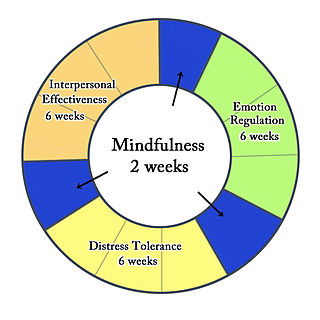
Cognitive Behavioral Therapy (CBT) is a psycho-social intervention that aims to reduce symptoms of various mental health conditions, primarily depression and anxiety disorders. Cognitive behavioral therapy is one of the most effective means of treatment for substance abuse and co-occurring mental health disorders. CBT focuses on challenging and changing cognitive distortions and their associated behaviors to improve emotional regulation and develop personal coping strategies that target solving current problems. Though it was originally designed to treat depression, its uses have been expanded to include the treatment of many mental health conditions, including anxiety, substance use disorders, marital problems, ADHD, and eating disorders. CBT includes a number of cognitive or behavioral psychotherapies that treat defined psychopathologies using evidence-based techniques and strategies.
Group psychotherapy or group therapy is a form of psychotherapy in which one or more therapists treat a small group of clients together as a group. The term can legitimately refer to any form of psychotherapy when delivered in a group format, including art therapy, cognitive behavioral therapy or interpersonal therapy, but it is usually applied to psychodynamic group therapy where the group context and group process is explicitly utilized as a mechanism of change by developing, exploring and examining interpersonal relationships within the group.

Psychology is an academic and applied discipline involving the scientific study of human mental functions and behavior. Occasionally, in addition or opposition to employing the scientific method, it also relies on symbolic interpretation and critical analysis, although these traditions have tended to be less pronounced than in other social sciences, such as sociology. Psychologists study phenomena such as perception, cognition, emotion, personality, behavior, and interpersonal relationships. Some, especially depth psychologists, also study the unconscious mind.

Dialectical behavior therapy (DBT) is an evidence-based psychotherapy that began with efforts to treat personality disorders and interpersonal conflicts. Evidence suggests that DBT can be useful in treating mood disorders and suicidal ideation, as well as for changing behavioral patterns such as self-harm and substance use. DBT evolved into a process in which the therapist and client work with acceptance and change-oriented strategies, and ultimately balance and synthesize them—comparable to the philosophical dialectical process of thesis and antithesis followed by synthesis.
Psychopathology is the study of abnormal cognition, behaviour, and experiences which differs according to social norms and rests upon a number of constructs that are deemed to be the social norm at any particular era.

Perfectionism, in psychology, is a broad personality trait characterized by a person's concern with striving for flawlessness and perfection and is accompanied by critical self-evaluations and concerns regarding others' evaluations. It is best conceptualized as a multidimensional and multilayered personality characteristic, and initially some psychologists thought that there were many positive and negative aspects. Perfectionism drives people to be concerned with achieving unattainable ideals or unrealistic goals that often lead to many forms of adjustment problems such as depression, anxiety, OCD, OCPD and low self-esteem. These adjustment problems often lead to suicidal thoughts and tendencies and influence or invite other psychological, physical, social, and further achievement problems in children, adolescents, and adults. Although perfectionist sights can reduce stress, anxiety, and panic, recent data, compiled by British psychologists Thomas Curran and Andrew Hill, show that perfectionistic tendencies are on the rise among recent generations of young people.

Cognitive analytic therapy (CAT) is a form of psychological therapy initially developed in the United Kingdom by Anthony Ryle. This time-limited therapy was developed in the context of the UK's National Health Service with the aim of providing effective and affordable psychological treatment which could be realistically provided in a resource constrained public health system. It is distinctive due to its intensive use of reformulation, its integration of cognitive and analytic practice and its collaborative nature, involving the patient very actively in their treatment.

Psychodynamic psychotherapy and psychoanalytic psychotherapy are two categories of psychological therapies. Their main purpose is revealing the unconscious content of a client's psyche in an effort to alleviate psychic tension, which is inner conflict within the mind that was created in a situation of extreme stress or emotional hardship, often in the state of distress. The terms "psychoanalytic psychotherapy" and "psychodynamic psychotherapy" are often used interchangeably, but a distinction can be made in practice: though psychodynamic psychotherapy largely relies on psychoanalytical theory, it employs substantially shorter treatment periods than traditional psychoanalytical therapies.
Behaviour therapy or behavioural psychotherapy is a broad term referring to clinical psychotherapy that uses techniques derived from behaviourism and/or cognitive psychology. It looks at specific, learned behaviours and how the environment, or other people's mental states, influences those behaviours, and consists of techniques based on behaviorism's theory of learning: respondent or operant conditioning. Behaviourists who practice these techniques are either behaviour analysts or cognitive-behavioural therapists. They tend to look for treatment outcomes that are objectively measurable. Behaviour therapy does not involve one specific method, but it has a wide range of techniques that can be used to treat a person's psychological problems.
Self-criticism involves how an individual evaluates oneself. Self-criticism in psychology is typically studied and discussed as a negative personality trait in which a person has a disrupted self-identity. The opposite of self-criticism would be someone who has a coherent, comprehensive, and generally positive self-identity. Self-criticism is often associated with major depressive disorder. Some theorists define self-criticism as a mark of a certain type of depression, and in general people with depression tend to be more self critical than those without depression. People with depression are typically higher on self-criticism than people without depression, and even after depressive episodes they will continue to display self-critical personalities. Much of the scientific focus on self-criticism is because of its association with depression.
Self-compassion is extending compassion to one's self in instances of perceived inadequacy, failure, or general suffering. Kristin Neff has defined self-compassion as being composed of three main elements – self-kindness, common humanity, and mindfulness.
Guided imagery is a mind-body intervention by which a trained practitioner or teacher helps a participant or patient to evoke and generate mental images that simulate or recreate the sensory perception of sights, sounds, tastes, smells, movements, and images associated with touch, such as texture, temperature, and pressure, as well as imaginative or mental content that the participant or patient experiences as defying conventional sensory categories, and that may precipitate strong emotions or feelings in the absence of the stimuli to which correlating sensory receptors are receptive.
Compassion-focused therapy (CFT) is a system of psychotherapy developed by Paul Gilbert that integrates techniques from cognitive behavioral therapy with concepts from evolutionary psychology, social psychology, developmental psychology, Buddhist psychology, and neuroscience. According to Gilbert, "One of its key concerns is to use compassionate mind training to help people develop and work with experiences of inner warmth, safeness and soothing, via compassion and self-compassion."
Sidney J. Blatt was a professor emeritus of psychiatry and psychology at Yale University's Department of psychiatry. Blatt was a psychoanalyst and clinical psychologist, empirical researcher and personality theoretician, who made enormous contributions to the understanding of personality development and psychopathology. His wide-ranging areas of scholarship and expertise included clinical assessment, psychoanalysis, cognitive schemas, mental representation, psychopathology, depression, schizophrenia, and the therapeutic process, as well as the history of art. During a long and productive academic career, Blatt published 16 books and nearly 250 articles and developed several extensively used assessment procedures. Blatt died on May 11, 2014, in Hamden, Conn. He was 85.
Adrian Wells, CPsychol, is a British clinical psychologist who is the creator of metacognitive therapy. He is Professor of Clinical and Experimental Psychopathology at the University of Manchester, U.K. and is also Professor II of Clinical Psychology at the Norwegian University of Science and Technology.
Clinton W. McLemore is an American psychologist and author.

Golan Shahar, Ph.D., is an Israeli clinical health psychologist and an interdisciplinary stress/psychopathology researcher.
Janet Deborah Carter is a New Zealand clinical psychology academic who became a full professor and dean of science at the University of Canterbury in 2016. She was appointed acting Pro Vice Chancellor of Science for 2019–2020, and acting Executive Dean of Science from mid 2021.
Dr. Paul L. Hewitt is a Full Professor in the Department of Psychology, an Associate Member of the Psychotherapy Program in the Faculty of Medicine at the University of British Columbia, and a Registered Psychologist in British Columbia, Canada. He is a Fellow of the Canadian Psychological Association and of its Section on Clinical Psychology. He has won numerous awards. In 2017, Hewitt was named one of the top 10 Canadian clinical psychology professors for research productivity and, in 2019, he was awarded the Canadian Psychological Association’s Donald O. Hebb Award for Distinguished Contributions to Psychology as a Science. Dr. Hewitt is a researcher and clinician and has had a private practice since 1988 which focuses on psychodynamic/interpersonal assessment and psychotherapy for individuals experiencing difficulties from perfectionistic behavior, early trauma, depression, anxiety, personality, and interpersonal problems.





